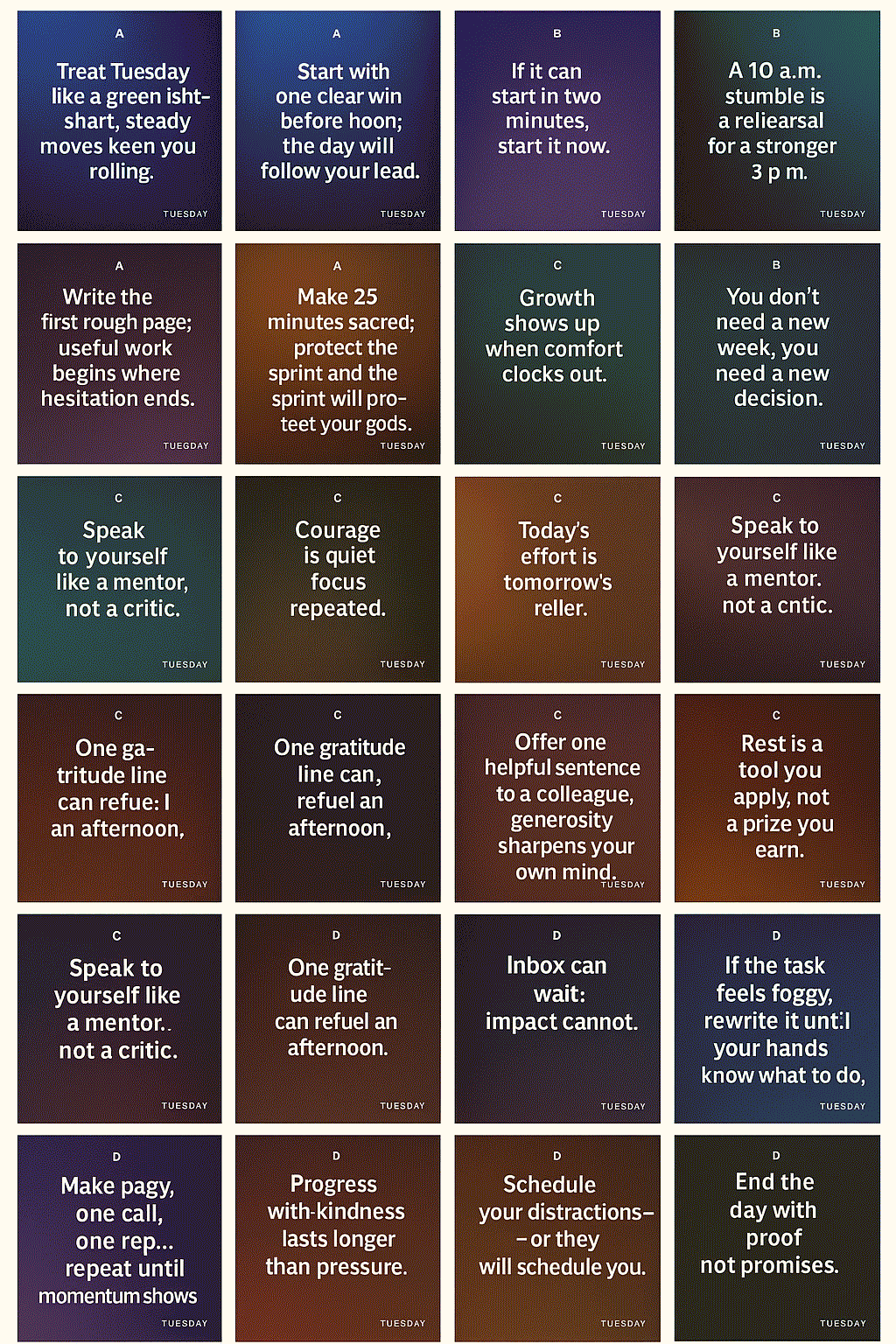
33 Tuesday Motivation Quotes to Empower You Immediately
Why Tuesday Works for Focus and Follow-Through
Many teams report the strongest output early in the week. Survey data places Monday and Tuesday at the top, with a large share naming these days as most productive.
Work-tracking datasets tell a similar story. Analyses of millions of tasks show a late-morning peak near 11 a.m. and heavier completion earlier in the week.
That rhythm makes Tuesday a practical target for one clear goal, one short sprint, and one proof of progress.
Motivation research adds a simple nudge: the fresh-start effect. Temporal landmarks (new week, new month, “after lunch”) raise the odds that people begin aspirational actions. If Monday slipped, treat Tuesday morning—or the first hour after lunch—as a new start.
This page shares original quotes and simple, evidence-based ways to use them. It offers practical tools (if-then plans, WOOP, Pomodoro, gratitude notes). No medical, legal, or financial advice is given.
Table of Content
- 33 Tuesday Motivation Quotes to Empower You Immediately
- How to Use Tuesday Motivation Quotes (Step-by-Step)
- 33 Tuesday Motivation Quotes (Original Lines You Can Use Today)
- Practical Tuesday Routines You Can Start Today
- Why These Tools Work
- Tuesday Motivation Quotes for Different Audiences
- Case Examples (Grounded in Everyday Practice)
- Make Your Own Tuesday Routine (Template)
- Ethical Notes
- Helpful Reminders for Tuesday
- FAQs
How to Use Tuesday Motivation Quotes (Step-by-Step)
1) Pick one quote from the list below. Post it where you can see it.
2) Write one measurable outcome for today. Specific, challenging goals guide attention and effort better than vague aims. Example: “Finish the first 600 words by 11:45.”
3) Add an if-then line. “If it’s 10:05, then I start a 25-minute sprint.” Implementation intentions raise follow-through across many settings.
4) Timebox your effort. Use a short cycle such as Pomodoro (25 minutes on, short break). It reduces switching and eases decision load.
5) Pair a treat with a dull task. This temptation bundling approach raised exercise rates in field experiments that tied audiobooks to gym visits. Use the same logic for admin work.
6) Reframe pressure. Cognitive reappraisal—changing the story you tell yourself about stress—supports steadier emotions and performance.
7) Write one gratitude line at lunch. Experiments link brief gratitude journaling with higher well-being and optimism.
8) Use self-compassion when you slip. Reviews and meta-analyses connect self-kindness with healthier persistence.
9) Clear tiny blockers fast. Apply the two-minute rule to free attention for the main task.
33 Tuesday Motivation Quotes (Original Lines You Can Use Today)
A. Focus & Momentum
-
“Treat Tuesday like a green light—short, steady moves keep you rolling.”
-
“Start with one clear win before noon; the day will follow your lead.”
-
“If it can start in two minutes, start it now.”
-
“Write the first rough page; useful work begins where hesitation ends.”
-
“Make 25 minutes sacred; protect the sprint and the sprint will protect your goals.”
-
“Pick one needle-mover; let the rest wait their turn.”
-
“Small steps stack; Tuesday is where progress learns to walk.”
-
“Begin before you believe; belief grows after action.”
B. Resilience & Mindset
-
“A 10 a.m. stumble is a rehearsal for a stronger 3 p.m.”
-
“Growth shows up when comfort clocks out.”
-
“Swap ‘perfect’ for ‘in progress’ and watch your pace change.”
-
“You don’t need a new week; you need a new decision.”
-
“When the plan slips, adjust the step—not the standard.”
-
“Today’s effort is tomorrow’s relief.”
-
“Courage is quiet focus repeated.”
-
“Your future self is watching this hour.”
C. Kindness to Self & Others
-
“Speak to yourself like a mentor, not a critic.”
-
“One gratitude line can refuel an afternoon.”
-
“Offer one helpful sentence to a colleague; generosity sharpens your own mind.”
-
“Rest is a tool you apply, not a prize you earn.”
-
“Progress with kindness lasts longer than pressure.”
-
“Change ‘I must’ to ‘I choose’ and feel the weight shift.”
D. Work & Study Sprinters
-
“Inbox can wait; impact cannot.”
-
“If the task feels foggy, rewrite it until your hands know what to do.”
-
“One page, one call, one rep—repeat until momentum shows up.”
-
“Make meetings earn their minutes.”
-
“Silence the tab that steals your best hour.”
-
“Draft now, polish after lunch.”
-
“Schedule your distractions—or they will schedule you.”
-
“Close loops: a finished small task frees a large mind.”
-
“Protect a 90-minute island—no boats, no visitors.”
-
“Let your calendar reflect your values, not your fears.”
-
“End the day with proof, not promises.”
Practical Tuesday Routines You Can Start Today
Tuesday Morning Starter (Students and Writers)
Goal:
A simple block that lowers friction and builds early momentum.
Minute 0–2: Choose Quote #2. Write one outcome for the session. Research on goal-setting favors specific, challenging targets for stronger focus and effort.
Minute 2–5: Add an if-then plan: “If it’s 9:30, then I start a 25-minute vocabulary drill.”
Minute 5–30: Run one Pomodoro (25). Short break.
Minute 30–33: Two-minute rule on tiny blockers (rename files, open sources).
Minute 33–45: Second micro-sprint (8–10). One gratitude line to close.
Why it works:
The block uses a clear cue (time), a short window, and a reward. It builds a proof of progress before noon, a time when task data often peaks.
Deep-Work Window for Professionals (60 Minutes)
Five-minute priming: write one measurable deliverable for the hour. Goal-setting reviews support specific targets over vague intentions.
Forty minutes quiet: run two Pomodoros. Hide inbox and chat. Pair admin work with a favorite playlist for temptation bundling. Field work on bundling shows higher adherence when a “want” rides along with a “should”.
Fifteen-minute debrief: one line on progress and one obstacle; convert the obstacle to an if-then plan for the next block.
Afternoon Reset (15–25 Minutes)
Fresh start frame: label 1:30–1:55 as a new beginning. Fresh-start landmarks often lift goal starts.
Reappraise pressure: rename it as “focus fuel.” Reviews link cognitive reappraisal to better emotion regulation and steadier performance.
Close a loop: pick three two-minute tasks and clear them. Many people report mental relief right after this step. The two-minute rule gained traction for a reason: tiny completions release attention.
Why These Tools Work
Specific Goals Beat Vague Aims
Decades of research connect specific, challenging goals with higher performance across work and study. The mechanism is simple: clarity directs attention and effort, and gives better feedback on progress.
If-Then Plans Turn Good Intentions into Action
Implementation intentions pre-decide the cue and the response: “If situation Y, then behavior X.” Findings point to reliable gains in getting started and staying on track.
WOOP Converts a Quote into a Plan
WOOP (Wish, Outcome, Obstacle, Plan) blends mental contrasting with if-then planning. It fits on a sticky note and takes about 90 seconds. The approach draws on studies across age groups.
Quick WOOP for Tuesday:
Wish: “Finish the first draft.”
Outcome: “A clean outline ready for edits.”
Obstacle: “Checking messages when stuck.”
Plan: “If I stall, then I switch to a 5-minute outline pass.”
Pomodoro Protects Attention
Short, fixed sprints reduce switching and help you start sooner. The original method from Francesco Cirillo remains a popular entry point for time-boxing.
Temptation Bundling Adds Pull to Boring Tasks
Pair a pleasant activity with a “should” task. Field experiments with audiobooks and exercise reported higher workout rates when the treat was tied to the workout window. Apply the same idea to inbox cleanup or filing.
Cognitive Reappraisal Keeps You Steady
Reframing stress—“this pressure can help me focus”—is linked with better emotion regulation and fewer unhelpful reactions. Reviews and meta-analyses describe benefits across settings.
Self-Compassion Helps You Continue After Slip-Ups
A kinder inner voice supports persistence, healthier habits, and lower self-criticism. Evidence spans meta-analyses and updated reviews.
Gratitude Journaling Lifts Mood and Engagement
Classic experiments show that counting blessings improves well-being and optimism in adults. Work with adolescents points in the same direction. One line at lunch is enough.
Unfinished Tasks Pull at Attention—Planning Releases It
The Zeigarnik effect describes how incomplete tasks remain active in the mind. Planning helps reduce intrusions from those tasks. This has been demonstrated in modern experiments on plan-making.
The Two-Minute Rule Clears Friction Fast
If a task takes two minutes or less, do it now. This rule lowers clutter and opens space for deeper work.
Tuesday Motivation Quotes for Different Audiences
For Students (Study and Exam Prep)
Use Quote #2 to secure one early win before class.
Turn Quote #3 into a desk routine: clear three tiny tasks before each study block.
Pair vocab drills with a short playlist to lift adherence.
Keep a notebook line for gratitude to stabilize mood during heavy weeks.
For Early-Career Professionals
Post Quote #23 near the monitor. Block inbox during two Pomodoros.
Use Quote #26 before every meeting: “What outcome earns these minutes?”
End the day with Quote #33. Capture proof of progress in one line.
For Managers and Teams
Open a Tuesday focus hour with each person sharing one measurable outcome for the next 45–60 minutes. Evidence favors specific targets.
Encourage if-then plans for common blockers (chat pings, unclear briefs).
Close with one rapid debrief: progress, obstacle, next if-then.
Case Examples (Grounded in Everyday Practice)
A writer’s Tuesday
A columnist sets a one-line outcome at 9:15 and runs two short sprints before checking messages. Quote #5 sits on a sticky note by the keyboard. The goal lands before lunch.
A student’s Tuesday
A biology major pairs flashcards with a short audio series during the walk to class. Quote #25 goes on the phone lock screen. One gratitude line at noon steadies mood during exam week.
A manager’s Tuesday
A team opens with three outcomes, each measurable. Everyone writes an if-then plan for the main blocker. Fifteen minutes before noon, the room does a quick loop-closing sweep using the two-minute rule.
Make Your Own Tuesday Routine (Template)
5-Step Card You Can Copy
Quote of the day: __________
Outcome by 11:45: __________
If-then cue at ________ : “If time hits X, then start Y.”
Sprint blocks: 25 min - 25 min
Gratitude line at lunch: ___________________
WOOP in 90 Seconds
Wish: ____________________
Outcome: _________________
Obstacle: _________________
Plan: “If ________, then ________.”
Ethical Notes
Content here is informational. It is not medical, legal, or financial advice.
Quotes are original. Guidance is grounded in established research and everyday practice.
Helpful Reminders for Tuesday
One quote is enough.
One outcome beats a dozen intentions.
One short sprint beats a long delay.
Kindness to yourself keeps you in the game.
A plan clears mental static from unfinished tasks.
FAQs
1) How many Tuesday motivation quotes should I use in a day?
Two is plenty. One in the morning and one after lunch. Pair each with a measurable outcome and a short sprint for best results.
2) Do these ideas help students and professionals alike?
Yes. Goal specificity, if-then cues, and brief time-boxed sprints support follow-through across roles and ages.
3) What if my morning was messy—should I wait for next week?
No. Use the fresh-start frame for the next block today. Start a 25-minute cycle and capture one proof of progress.
4) Does gratitude journaling need a full page?
No. One sentence works and still shows benefits in controlled studies.
5) Why bother clearing tiny tasks right away?
Unfinished tasks keep tugging at attention. A quick plan—or a two-minute completion—reduces that pull and frees focus for deeper work.
Motivational Topics Study Motivation


